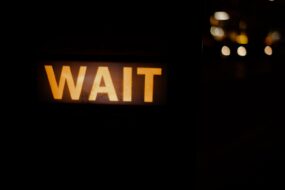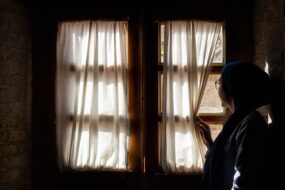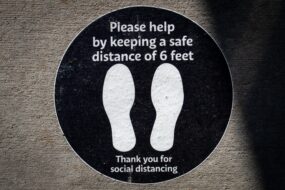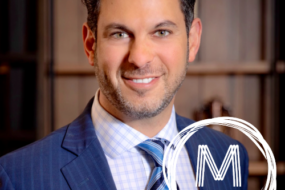December 5, 2023 • Life for Leaders
Scripture — Romans 8:19-21 (NRSV)
For the creation waits with eager longing for the revealing of the children of God; for the creation was subjected to futility, not of its own will but by the will of the one who subjected it, in hope that the creation itself will be set free from its bondage to decay and will obtain the freedom of the glory of the children of God.
Focus
When we consider the futile and decaying state of our world, including our own lives, we could easily fall into despair. But Romans 8 encourages us to join creation in waiting for the time when God mends what is broken. We wait “in hope,” which from a biblical point of view isn’t wishful thinking but rather confidence in God’s faithfulness to restore and redeem all things. Thus, when we hear of natural disasters, suffer with decay in our own bodies, or worry about the state of the natural world, we are invited into a deeper experience of Advent.
Today’s devotion is part of the series Advent for the Children of God.
Devotion
In a recent TV Christmas special the host said, “My favorite thing about Christmas. I don’t know about you. I mean, it’s got to be snow.” Now, though she may have been missing the main point of Christmas, she’s certainly not alone when it comes to celebrating snow at Christmastime. Just think of how often snow is featured in our beloved seasonal songs: “Let It Snow,” “Winter Wonderland,” “Jingle Bells,” and, of course, “White Christmas.”
There is certainly something wonderful about snow, especially when it’s “new-fallen snow.” Snow can be beautiful to look at and fun to play in. Think of skiing, snowboarding, and snowball fights. Snow is also useful in that it supplies much of the water we need to live, especially where I live in California. All of this is true about snow. But if you’ve ever lived in a place where it snows a lot, you may have mixed feelings about snow. It can make life much more difficult in many ways. Snow requires shoveling, blowing, scraping, and plowing. It can make getting to work or school almost impossible. It can exacerbate isolation and loneliness for those who are stuck at home. Snow can even pose a serious risk to health and life. Sadly, every year we hear about people dying in their cars when they’re caught in blizzards.
Our experience of snow points to the mixed character of the world in which we live. God created this world as “very good” (Genesis 1:31). But the goodness of creation was corrupted by sin (Genesis 3:16-19). Creation’s original goodness wasn’t obliterated completely, however. Snow can still give us joy at times. But the brokenness of creation means that snow makes our lives much more difficult, sometimes even cutting them short.
Now you may be wondering how my seasonal reflections on snow have anything to do with Advent and Romans 8. Admittedly, snow is not mentioned in the biblical passage we’re examining these days. But Romans 8:19-21 does have some fascinating things to say about the created world. In fact, this passage suggests that in some surprising ways creation itself experiences the fundamental realities of Advent.
Verse 19, for example, says that “the creation waits with eager longing for the revealing of the children of God” (Romans 8:19). Waiting, of course, is essential to the experience of Advent. Why is creation waiting in this way? Verses 20-21 explain that “the creation was subjected to futility, not of its own will but by the will of the one who subjected it, in hope that the creation itself will be set free from its bondage to decay and will obtain the freedom of the glory of the children of God” (8:20-21). To be sure, these verses are not easy to interpret. But, for now, I want simply to point out that hope is central to them. (Plus, in the next 3 verses hope will appear again several times.)
It’s clear from this passage that creation is not what God originally intended it to be. The created world experiences “futility” (8:20). The Greek noun mataiotēs, translated here as “futility,” can also mean “emptiness” or “purposelessness.” Moreover, creation is caught in “bondage to decay” (8:21). Things in this world don’t work as they should and even when they do, they eventually break down. Therefore, it could be said that creation is waiting to be mended and made whole. This waiting happens, not with despair, but with hope, that is with confidence that when the time is right God will restore what was lost when sin corrupted not just humanity, but creation itself.
I began this devotion with the example of snow as something that reflects the brokenness of this world. Yes, it can be delightful, but snow often wreaks havoc in our lives. There are many other ways in which futility and decay pervade the created world. Examples could include destructive forest fires, hurricanes, tornadoes, and floods. On a personal level, we might think of cancer, heart disease, and a host of other human ailments. Of course, we’re all too familiar with how a tiny virus can devastate the entire world, killing millions of people in the process.
When we consider the futile and decaying state of our world, including our own bodies, we could easily fall into despair. But Romans 8 encourages us to join creation in waiting for the time when God will mend what is broken. We wait “in hope,” which from a biblical point of view isn’t wishful thinking but rather confidence in God’s faithfulness to restore and redeem all things. Thus, when we hear of natural disasters, suffer with decay in our bodies, or worry about the state of the natural world, we are invited into a deeper experience of Advent.
In this way we are also preparing our hearts for a deeper experience of Christmas, when the earth will “receive her King.” On that day, “heav’n and nature” will sing with joy. No longer will “thorns infest the ground.” Rather, Christ will come “to make His blessings flow far as the curse is found.” (selected lyrics from “Joy to the World” by Isaac Watts, 1719).
Reflect
How have you experienced snow in your life? As an invitation to wonder and play? As something that makes life difficult? Perhaps both?
When you read about creation experiencing futility and decay, what comes to mind?
As you reflect on the creative picture of creation waiting and hoping, how do you respond?
What helps you to wait with hope for God to mend the broken world?
Act
It’s likely that you know someone who is personally experiencing the futility and decay of our broken world. Pray for this person today. As you do, ask the Lord how you might reach out with loving concern to him or her.
Pray
Gracious God, once again we thank you for the season of Advent. Thank you also for the way Advent themes show up in Romans 8, thus giving us new ways to think about and experience this season.
Creator God, you made the world very good, full of wonder, delight, and usefulness. But our sin corrupted your creation. We experience this corruption in multiple ways both global and personal.
We mourn for the suffering that comes from this broken world. And we yearn for the day when you will mend all things. As we wait, we do so with hope based on your faithfulness, grace, and love. Amen.
Find all Life for Leaders devotions here. Explore what the Bible has to say about work at the unique website of our partners, the Theology of Work Project’s online commentary. Reflection on today’s Life for Leaders theme can be found here: Eagerly Awaiting Bodily Redemption for Ourselves and God’s Creation (Romans 8:18–30).
Subscribe to Life for Leaders
Sign up to receive a Life for Leaders devotional each day in your inbox. It’s free to subscribe and you can unsubscribe at any time.

Dr. Mark D. Roberts is a Senior Strategist for Fuller’s Max De Pree Center for Leadership, where he focuses on the spiritual development and thriving of leaders. He is the principal writer of the daily devotional, Life for Leaders, and the founder of the De Pree Center’s Flourishing in the Third Third of Life Initiative. Previously, Mark was the Executive Director of the De Pree Center, the lead pastor of a church in Southern California, and the Senior Director of Laity Lodge in Texas. He has written eight books, dozens of articles, and over 2,500 devotions that help people discover the difference God makes in their daily life and leadership. With a Ph.D. in New Testament from Harvard, Mark teaches at Fuller Seminary, most recently in his D.Min. cohort on “Faith, Work, Economics, and Vocation.” Mark is married to Linda, a marriage and family counselor, spiritual director, and executive coach. Their two grown children are educators on the high school and college level.




